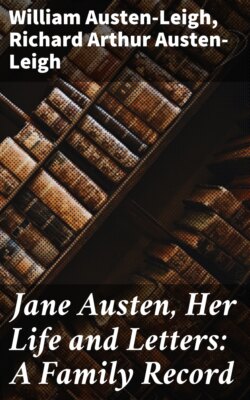Читать книгу Jane Austen, Her Life and Letters: A Family Record - William Austen-Leigh - Страница 21
На сайте Литреса книга снята с продажи.
ОглавлениеYour accommodations at Steventon are the only things my Aunt Austen and myself are uneasy about, as the house being very full of company, she says she can only promise you 'a place to hide your head in,' but I think you will not mind this inconvenience. I am sure I should not—to be with you. Do not let your dress neither disturb you, as I think I can manage it so that the Green Room should provide you with what is necessary for acting. We purpose setting out the 17th of December. … I assure you we shall have a most brilliant party and a great deal of amusement, the house full of company, frequent balls. You cannot possibly resist so many temptations, especially when I tell you your old friend James is returned from France and is to be of the acting party.
But Phila still stood out, and Eliza attacked her once more on November 23, begging her to come for a fortnight to Steventon, provided she could bring herself to act, 'for my Aunt Austen declares "she has not room for any idle young people."'
We hear no more news of these theatricals, but it is probable that there was a change in the selection of the plays, for there is extant a prologue by James Austen to The Wonder,[48] acted at Steventon, December 26 and 28, 1787, as well as an epilogue 'spoken by a Lady in the character of Violante.' There is also a prologue to The Chances,[49] acted at Steventon, January 1788.
The last Steventon performances of which we have any knowledge took place in January 1790, when a farce called The Sultan[50] was acted. The leading lady on this last occasion was Miss Cooper, who spoke the epilogue in the character of Roxalana, Henry Austen playing the title-rôle. On the same occasion Townley's farce, High Life below Stairs, was also given.
Of Jane's own part in these performances there is no record, for she was only just fourteen when the last took place. But even if she took no more share than Fanny Price, she must have acquired a considerable acquaintance with the language of the theatre—knowledge that she was to turn to good account in Mansfield Park. She was an early observer, and it might reasonably be supposed that some of the incidents and feelings which are so vividly painted in the Mansfield Park theatricals are due to her recollections of these entertainments.
The talent and liveliness which she would show, if ever she had an opportunity of acting herself, may be imagined. The late Sir William Heathcote is said to have remembered being with her at a Twelfth Night party when he was a little boy, on which occasion she, having drawn the part of Mrs. Candour, acted it with appreciation and spirit.
